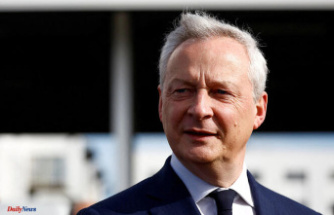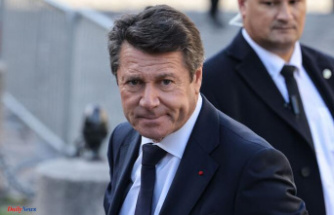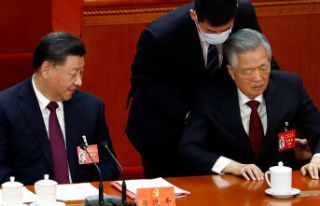In an interview with ntv.de, former Greek Finance Minister Yanis Varoufakis paints a bleak picture: Germany's business model has failed as a result of the current energy crisis and the economic failure of the European Union is inevitable.
He says of former Chancellor Merkel that she wasted "a huge amount of political capital." "No other chancellor will ever again have the ability to create such political capital to even be able to move Europe forward."
ntv.de: How would you describe Germany's role within the European Union at the moment?
Yanis Varoufakis: There is a big change: The German economic model has collapsed. The German model was based on cheap energy from Russia, selling products to China and low wages within Germany. But the current situation looks like this: Inflation has made it impossible to push down wages, gas has become expensive and China is disappearing as a market for Germany due to a new cold war between China and the USA, which the Biden government is escalating.
And what has remained the same in Germany?
The constant insistence of the current German federal government - and previous governments - on acting unilaterally and thereby supporting the fiscal strategy of achieving an export surplus - is neo-mercantilism at its core. On the other hand, Germany prevents the rest of the eurozone from doing the same and implementing equivalent measures.
Is Germany a bully?
I don't like the word. But Germany insists on its fiscal power, which other parts of the EU do not have. To put it another way: Germany disregards competitive equality within the European Union.
Can you understand the criticism of Germany's €200 billion relief package? Other EU countries had rated this as lacking in solidarity...
Yes, I can understand the criticism. That's a double standard. Germany insists on a single market and a supposed level playing field while pushing through state aid for its industry and consumers. State aid that the rest of the EU cannot introduce due to fiscal policy rules that apply to everyone except Germany.
Should the European Union decide on a genuine EU-wide gas price cap, or do you understand Olaf Scholz's warning that this could result in less gas being sold to the EU?
I understand Olaf Scholz's argument. But here, too, it shows again that Scholz is simply not in a position to conceive a common European political line. Otherwise he would understand that the EU could jointly procure gas by using its enormous monopoly demand. Then there would be no supply problem. Of course, if you just introduce a price cap without using the collective purchasing power of the EU, then Scholz is right. So Scholz makes a point that is correct, but then pursues a policy that is wrong.
In these times of crisis: is the EU standing together or is it currently failing?
I would put it more clearly: the problem with the European Union is that there is no European Union at all. As a name yes, but not in reality. When it comes to refugees or migrants, everyone does their own thing. When it comes to gas, too. When it comes to the transition to green technologies, we don't have a green Union either. In the banking sector we still do not have a common deposit insurance and there is no Eurobond either. All the things that would make a European Union real are missing. And of course you see something like this even more clearly in times of crisis.
But do you think the EU will make it through this energy crisis? Many people worry about winter.
Failure is guaranteed. We are already seeing rapid de-industrialization in Europe. EU companies pay ten times more for gas than their US or Chinese competitors. There is already the disruption of production and very soon we will see factories looking for new locations in the US or in other countries. The EU is in a deep crisis. You will probably not see that this winter, but only next. The gas storage tanks were filled this summer, but this will only be possible next summer at significantly higher costs.
You have already mentioned China. There is also a controversial debate in Germany, as Chancellor Scholz apparently wants to allow parts of the Port of Hamburg to be sold to the Chinese. Has Germany learned nothing from the past and the danger of dependencies? How do you see it?
The situation is complex and it is not simply black and white. At least a third of the German business model is based on selling products to China. It seems to me that Berlin is quite obviously turning a blind eye - just like with Russian gas. In this case, one ignores the new Cold War that is currently developing between the USA and China and simply carries on as before.
Another perspective, however, is this: I think, personally and politically, that this new cold war between the US and China will be catastrophic for the world. I am extremely upset that US President Joe Biden's administration is also fomenting this war. Biden's recent statements have basically set us down a path of nuclear standoff between the US and China. And I blame the US for that.
As for Scholz and the port, if Scholz played the part of a mediator between Washington, Beijing and Berlin and the sale to Cosco was part of that peace process, then I would welcome that. But I think Olaf Scholz is a political dwarf who doesn't have the capacity to think like that at all. Therefore, selling to Cosco would not be a strategy to make the world more stable, but ultimately just another case of short-sightedness.
Finally, this question: How do you see Angela Merkel's legacy today?
She was a remarkably adept negotiator and a short-term crisis manager with a unique ability to ensure that when things should have changed, nothing changed. In that sense it has squandered a huge amount of political capital. No other chancellor will ever again have the ability to create such political capital to even be able to move Europe forward. So we have to criticize her for wasting this capital.
Philipp Sandmann spoke to Yanis Varoufakis












